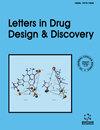Crocin Potentiates Anti-tumor Properties of 5-FU by Regulating Cell Proliferation and Tumor Necrosis in Breast Cancer
IF 1.6
4区 医学
Q4 CHEMISTRY, MEDICINAL
引用次数: 0
Abstract
Introduction:: Breast cancer is one of the most prevalent malignancies among women around the world. Crocus sativus, a natural food coloring and flavoring, has potent anti-tumor properties. The aim of the current study was to investigate the therapeutic potential of crocin, the main pharmacological active component of saffron, either alone or in combination with the standard chemotherapeutic treatment, 5-FU, in Breast cancer (BC) progression in both cellular and animal models. Material and Methods: MTT, Real-Time PCR, Western Blotting, Hematoxylin and eosin (H&E) tissue staining were applied to determine the anti-tumor properties of crocin in in vitro and in vivo samples. Results:: Our findings showed that crocin decreased breast cancer cell proliferation by suppressing cyclin D1 expression and Wnt/β-catenin signaling activation. Moreover, this molecule improved 5- FU anti-cancer activities by decreasing the tumor volume and weight, increasing tumor necrosis, and suppressing tumor inflammation in an animal model. Inflammation-associated anti-cancer activity of crocin is mediated by the down-regulation of pro-inflammatory genes, including IFN-γ and IL-1β, as well as inhibition of oxidative stress responses within the tumor environment. Conclusion:: This is the first study demonstrating the potent anti-tumor properties of crocin against BC progression. Our results suggest that this effective and low-toxic molecule could be a promising agent for reducing BC tumor progression when administered either alone or in combination with standard treatment in breast cancer patients.克罗霉素通过调节乳腺癌细胞增殖和肿瘤坏死增强 5-FU 的抗肿瘤作用
导言乳腺癌是全世界妇女最常见的恶性肿瘤之一。藏红花是一种天然食用色素和香料,具有强大的抗肿瘤特性。本研究旨在探讨藏红花的主要药理活性成分藏红花素单独或与标准化疗药物 5-FU 联合使用对乳腺癌(BC)细胞和动物模型进展的治疗潜力。材料与方法应用 MTT、Real-Time PCR、Western 印迹、血氧菌素和伊红(H&E)组织染色法确定藏红花苷在体外和体内样本中的抗肿瘤特性。结果我们的研究结果表明,巴豆素能抑制细胞周期蛋白 D1 的表达和 Wnt/β-catenin 信号的激活,从而减少乳腺癌细胞的增殖。此外,在动物模型中,该分子通过减少肿瘤体积和重量、增加肿瘤坏死和抑制肿瘤炎症,提高了 5- FU 抗癌活性。炎症相关的黄花苷抗癌活性是通过下调促炎症基因(包括 IFN-γ 和 IL-1β)以及抑制肿瘤环境中的氧化应激反应来介导的。结论这是第一项证明巴豆苷能有效抗肿瘤的研究。我们的研究结果表明,这种有效且低毒的分子在单独给药或与乳腺癌患者的标准治疗联合使用时,可能是一种很有前途的减少乳腺癌肿瘤进展的药物。
本文章由计算机程序翻译,如有差异,请以英文原文为准。
求助全文
约1分钟内获得全文
求助全文
来源期刊
CiteScore
1.80
自引率
10.00%
发文量
245
审稿时长
3 months
期刊介绍:
Aims & Scope
Letters in Drug Design & Discovery publishes letters, mini-reviews, highlights and guest edited thematic issues in all areas of rational drug design and discovery including medicinal chemistry, in-silico drug design, combinatorial chemistry, high-throughput screening, drug targets, and structure-activity relationships. The emphasis is on publishing quality papers very rapidly by taking full advantage of latest Internet technology for both submission and review of manuscripts. The online journal is an essential reading to all pharmaceutical scientists involved in research in drug design and discovery.

 求助内容:
求助内容: 应助结果提醒方式:
应助结果提醒方式:


